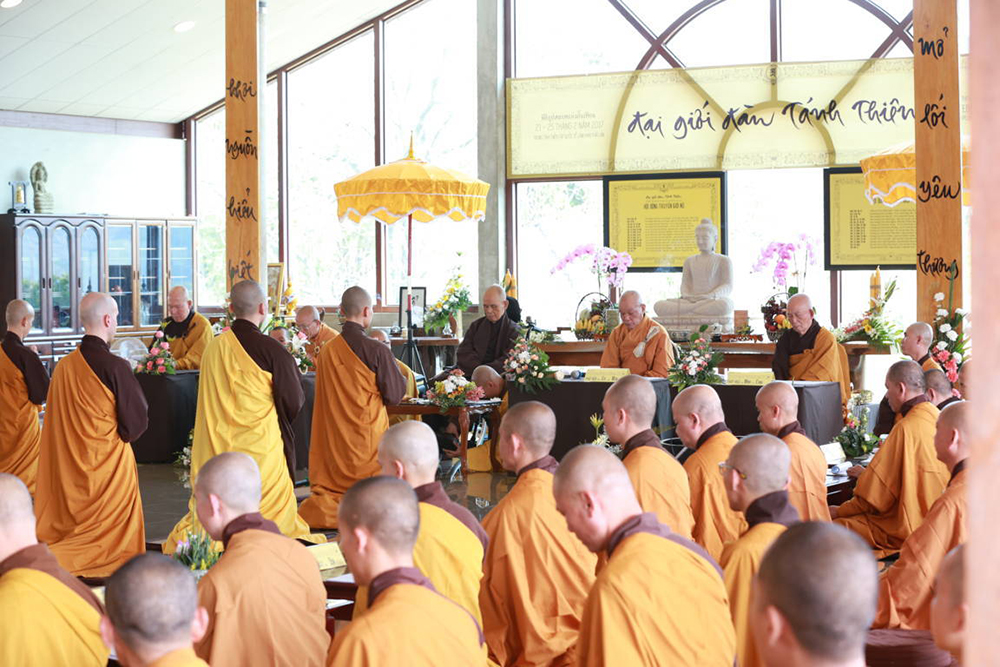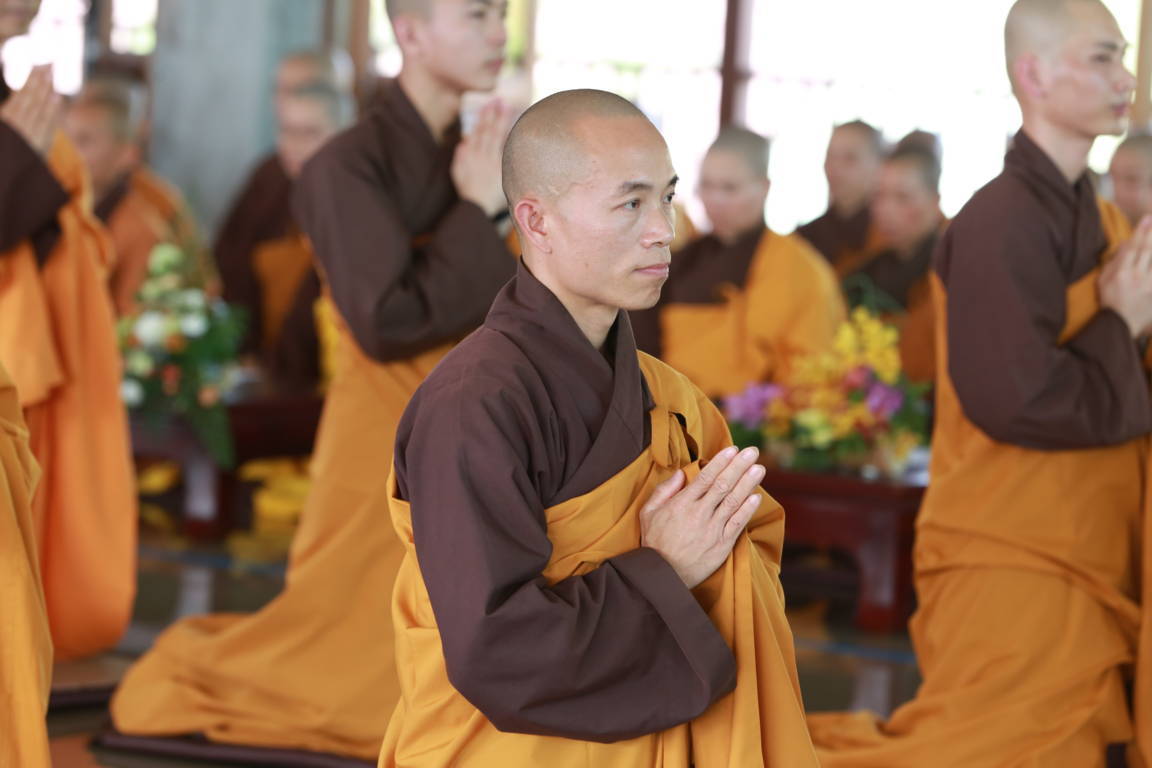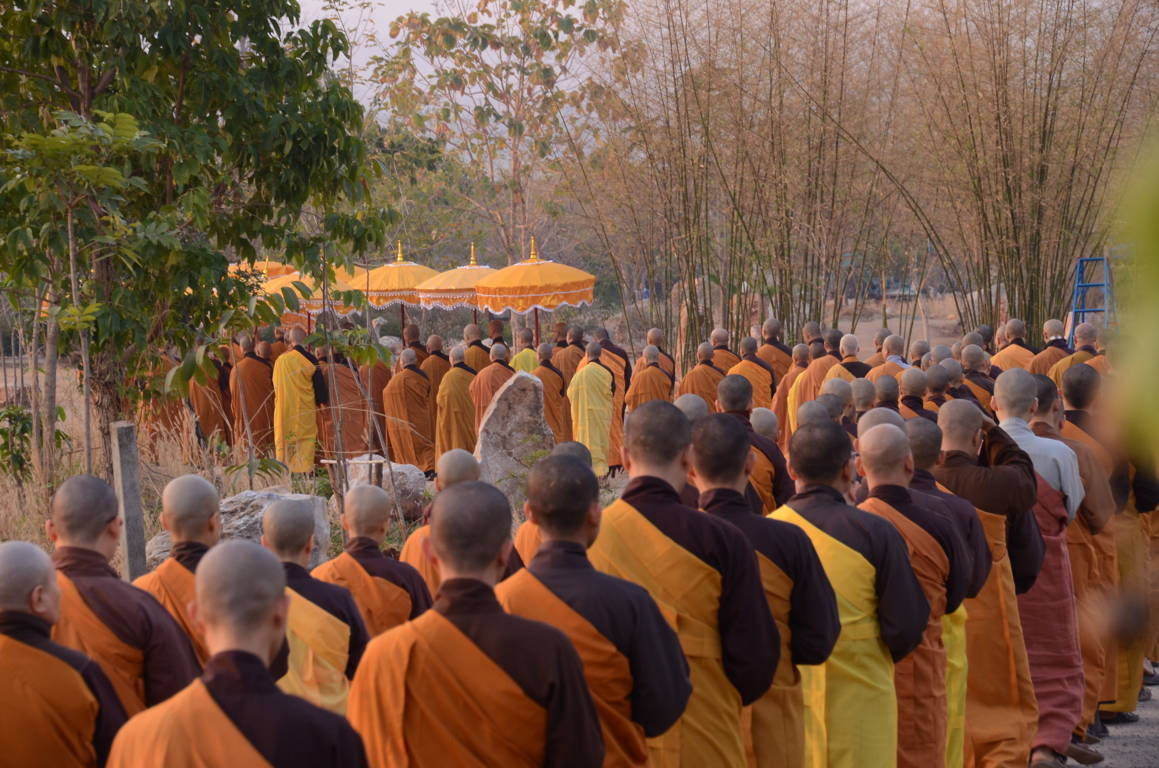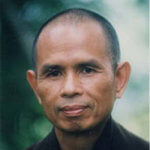Part One
By Thich Nhat Hanh in June 2017
Retreat on Buddhist Psychology
Key West, Florida
November 7, 1997

When the seed of anger in us is touched,
Part One
By Thich Nhat Hanh in June 2017
Retreat on Buddhist Psychology
Key West, Florida
November 7, 1997

When the seed of anger in us is touched, and when it manifests in our mental consciousness as the energy of anger, we have to be aware of it right away. First, we have to produce mindfulness to be aware that the energy of anger is coming up. That is the practice of mindfulness of anger. Breathing in, I know I am angry. Breathing out, I know that anger has manifested. You continue to follow your in-breath and out-breath, generating the energy of mindfulness to embrace your anger. You might like to do walking meditation to help you continue to generate the power of mindfulness. Breathing in, I know I am angry. Breathing out, I know I have to take good care of my anger.
When your house is on fire, the most important thing to do is to try to put out the fire, not to run after the person you believe to be the arsonist. You go home and take good care of your anger. That is why it is recommended that you do not look at or continue to listen to the other person. You have to go home to yourself and begin to attend to your anger. You might have a small room in your home to take refuge when you don’t feel stable, or you might go outside for mindful walking. These are the recommendations I would like my friends to follow to take good care of your anger. If you follow these proposals, you will be able to deal with your anger and transform it. Don’t say anything, don’t do anything in anger. This is very important. This does not mean that you suppress your anger. You recognize your anger, you allow it to be, and you embrace it.
Solitude is the environment you need in this difficult time. When you suffer, you don’t want to be with other people. You want to withdraw, to be alone. This is a natural tendency in us. So anytime you get angry, follow that natural desire. Withdraw from others, practice mindfulness of breathing or walking, and take good care of your anger. Don’t do anything or say anything. You are determined to do so; it’s very important.
Within twenty-four hours, you have to let the other person know that you are angry, that you suffer, and that you want him to know it. You should not hide your suffering. Sometimes you are too proud to admit it, but in fact you are very angry. So if possible, you tell him, but only using calm, loving speech. It’s not healthy to maintain your anger more than twenty-four hours, but if, by that time, you don’t feel calm enough to tell him, you write a peace note to him. There are only three small lines in the note.
The first line is: “I am angry, I suffer, and I want you to know it.” It’s very light and simple, and since your commitment with the other person is deep, you have the right to tell him or her that you suffer. It’s also your duty, because you have promised to share everything with him or with her.
The second line is: “I am trying my best.” It means I am trying my best to practice as I have learned from the Buddha, from my teacher. That will inspire respect in the other person. She will know you are practicing mindful breathing, mindful walking, embracing your anger, and looking deeply into the nature of your anger. By doing so, you might discover that your anger has no foundation, that it is based on a wrong perception. Then you can let go of it easily, and you can tell her, “Sorry, that was a wrong perception on my part.”
But if the other person has played a role in making you suffer, you will have to practice looking deeply to understand why she has done it. You may have been responsible for this anger to some extent; you may have said or done something that made her react strongly against you.
You may also see that the other person is a victim of wrong perception. In this case, punishing him will not help him; you need to show him that he had a wrong perception. That is the loving way of supporting him, of helping him get out of his suffering. If you look more deeply, you may see that this is a habit energy that he received when he was a little boy. When you begin to understand in this way, the anger subsides.
So first, generate the energy of mindfulness. Second, recognize your anger and embrace it. And third, look into the nature of your anger for insight to come. During the time you practice mindful breathing and mindful walking, you practice these things. This is meditation. Stopping, calming, concentrating, and looking deeply.

THE LANGUAGE OF LOVE
You wrote the first line: “Darling, I suffer. I am angry, and I want you to know it.”
And the second line: “I am doing my best.” And if you want to do better, you add a third line: “Please help me.” This line is important because when you feel hurt, you want to prove that you don’t need her. So this line will appease a lot of your anger, and that is the language of love. Love is still possible, even with anger in you. How can this be? Because mindfulness is also there. Your mindfulness is capable of everything. Mindfulness will help you recognize your anger, embrace your anger, look deeply into your anger, and use loving speech to convey your feeling to the other person. This person may be your father, your son, or your daughter. This person may be your partner. For all these situations the practice is the same. Please remember the three sentences. And next time you get angry, please try. The first line: “Darling, I suffer, I am so angry and I want you to know it.” This is already love. Second line: “I am doing my best.” It means, please do your best, too, to support me. And third: “Please help me.” I think that there will be a change of attitude in the other person after he receives the message. And after you have handed him this little piece of paper, you will feel better.

If the other person asks for a discussion, don’t accept right away. Say, “I need some time to practice and to look more deeply into the matter.” Because if you engage in discussion when you are angry, your anger may take over and push you to say things that you will regret later. You might propose Friday evening for a meeting, because if you can solve the problem by Friday evening, you have the weekend for your enjoyment. [laughter] Usually, this meeting is not a discussion; it is an opportunity for the person who suffers to express himself while the other person listens without responding.
This is a deep practice that we have to train ourselves to do, the practice of deep listening and of loving speech. You are expected to tell the other person everything you feel, using calm and loving speech. You can tell her all of your suffering in the kind of language that can help her to receive and understand. Make sure that when you have a chance to pour your heart out, all of your anger is gone and you can do it serenely. This is a real training.
The other person has to practice deep and compassionate listening. Compassionate listening is listening just to give the other person a chance to express himself. It is not listening to judge, to criticize, to analyze. You have to train yourself to listen in this way.
In Buddhist circles, we bow to the bodhisattva Avalokiteshvara, because this is someone who has the capacity to listen with compassion. This bodhisattva is also called Kwan Yin or Kwan Te Am, which means “listening to the suffering of the world.” Because you have compassion, you can sit very still as you’re listening to everything the other person says, even if she says wrong things, even if she is very angry. If she condemns you and judges you unjustly, you are still capable of listening deeply with compassion, because you know listening like this is to help her get relief.
Psychotherapists are supposed to learn the art of compassionate listening. This is their fundamental practice, to sit there and listen. While listening, they have to keep their compassion alive. If you can listen to a person like that for one hour, you will relieve a lot of pain and suffering for him or for her. Many psychotherapists I know cannot listen very deeply because they still have a lot of pain and sorrow within themselves. So when they listen, they get lost in their own suffering and the effect of their listening is not great. You have to be very mindful and concentrated. You have to have a lot of energy of compassion in you to listen in the style of Avalokiteshvara. If you can listen like that, the other person will feel it and get relief. We all have to train ourselves to listen deeply. If you are not a therapist but you know the art of compassionate listening, and if you can listen to the person you love, you will become the best therapist in the world for him or her. You are motivated by love, by a desire to make him suffer less.

In the talk there may be a lot of bitterness, of condemnation, of injustice, and yet you are still capable of listening. We listen like this for one purpose only: to give him a chance to speak out. If you bow to the bodhisattva Kwan Yin, and if you chant her name, you are aspiring to practice like her. This is the practice of deep listening, of compassionate listening.
RESTORING COMMUNICATION
Mindfulness is the energy behind compassionate listening and loving speech. If you do not have the energy of mindfulness, your listening will not be deep listening, and your speaking will not be loving. That is why cultivating the energy of mindfulness is the basic practice of meditation, because if you can speak mindfully, you can relieve suffering and bring a lot of joy to people. But with unmindful speech, you can create a lot of suffering. That is why mindful breathing, mindful walking, mindful sitting, and mindfully doing our daily activities are essential to generate of the energy of mindfulness. If communication has become difficult, only mindful, deep listening and loving speech can restore it.
We see families where the father cannot talk to the mother, the son cannot talk to his parents, because everyone is full of anger and suffering. Everyone has lost their capacity to listen and to use loving speech. The person may say, “I cannot listen to you because your language is full of bitterness and anger; it makes me suffer so much. That is why I try to avoid you, and then you think I am trying to boycott you.” And they become more angry, and they despair. In fact, they do not want to boycott you, but they have lost their capacity of compassionate listening, because after listening to you for a few minutes, they become angry and suffer a lot. That is why they try to avoid you. That is the feeling of the son towards his father, of a wife towards her husband. Many of us have lost our capacity of listening to each other and communicating with each other with loving speech.
We live in a time when techniques of communication are very sophisticated. We need less and less time to transmit information from one end of the planet to the other. We have fax, we have email, we have everything, and yet in our lives, communication has become so difficult, even impossible. That is why we should all train ourselves to be able to communicate again. If communication is possible, things are not so bad. Restoring communication is our practice. Therapists as well as other people have to train themselves in this art, and transmit the art of communication to the people they want to help.
RECOGNIZING OUR RESPONSIBILITY
A retreat might help us train ourselves in using loving speech and looking deeply. “Looking deeply, I realize that the other person has made me suffer, but I also know that I have played a part in making him suffer.” Usually we think of ourselves as the victim of the other person. But the responsibility never belongs to only one person. We have to recognize that we also have not been mindful enough, we have not been skillful enough, and we have made mistakes. Of course, the other person, out of anger and hatred, has made our life miserable, but what have we done to help the other person, because we know that the other person is deeply unhappy?
When we first began to live with the other person, he was not like that. He was fresh, he was smiling. He was using loving speech that made us happy. Why has he transformed into such a difficult person? His speech is now full of bitterness and anger. Is it because of him, of society? Yes, maybe. But it is also partly because of us. We have not been able to take good care of our flower, so our flower has turned into a piece of garbage. Now it is our practice to turn garbage back into a flower again. The practice of deep listening and loving speech will help us do that. After a few days of looking deeply, you will see your responsibility in it. Then you go back to him, calm, serene, mindful, with compassion for him and for yourself. You sit close to him and you say, “My husband, I know you have suffered a lot during the past few days. I have seen it, and that makes me suffer also. Out of forgetfulness, out of unskillfulness, I have made you suffer. I have not taken good care of you, and I now realize that. So please allow me a chance to begin anew. Please tell me what is in your heart—your suffering, your confusion, because now I know how to listen to it. My deep intention is to help you stop suffering and to make you happy.”
When you are able to use that kind of language, you will open the door of his heart. Train yourself so that you can speak that kind of language. A few days of practice can result in such a capacity. When you truly understand the situation, you have the capacity of recognizing your own mistakes and speaking with loving kindness. He might begin to cry, because for many years you have not talked to him that way. He may cry like an infant, and you have to sit very still in order to listen. “My dear husband, please help me. Please tell me what is in your heart. I really want to know. I know I have made mistakes. If you don’t help me, how can I overcome this?” And then he will begin to tell you.
There may be a time when he cannot continue, and you have to sit very still. You might say a few words, “I am sorry. I’m sorry you’re suffering so much.” I have sat in a meeting where the person concerned could not say a word. There were five or six monks, and they sat ready to listen to the other person, but the other person could not speak, although he knew this was a golden opportunity for him to share the suffering in his heart, but he could not, because the pain was so intense. Sometimes we have to sit there and breathe in, breathe out, for fifteen or twenty minutes in order for him to be able to say another word. You need a lot of compassion and patience for deep listening. But if you can help the other person speak, it can be very healing and transforming. So if we are determined to use loving speech, if we are determined to use deep listening, we’ll be able to restore communication and to transform the situation in the direction we want.
“Handling Strong Emotions,” Part Two, published in the Autumn 2017 edition of the Mindfulness Bell, shares how mindful consumption helps us transform the blocks of pain in us and water our wholesome seeds.
Transcribed by Greg Sever. Edited by Barbara Casey.
All photos accompanying this article are from the Tanh Thien Great Precept Transmission Ceremony at the Thai Plum Village International Practice Center in February 2017. Many of the Most Venerable Monks and Nuns from Vietnam came to witness and give spiritual support and strength to the ordinees (novices who received full ordination). This was the first time the Great Precept Transmission Ceremony took place in Asia with Thich Nhat Hanh’s presence.


